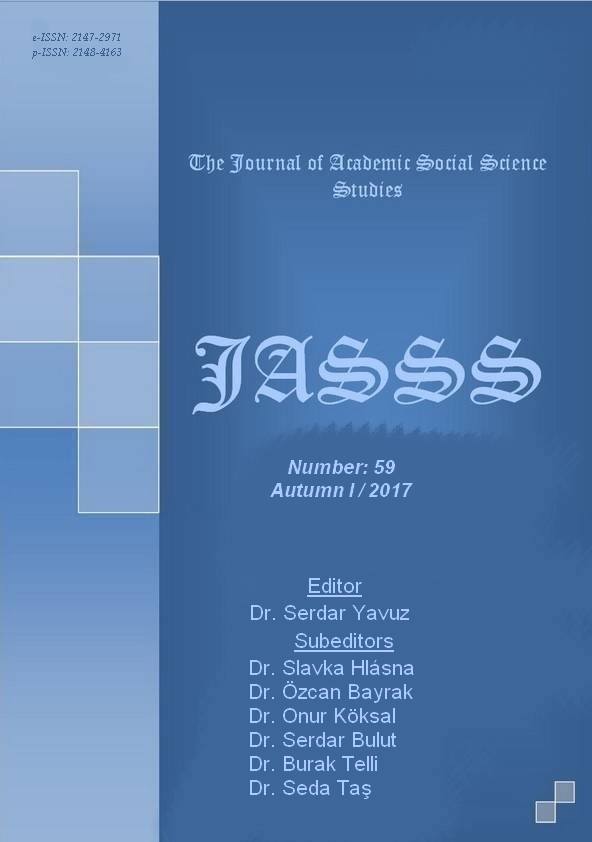Author :
Abstract
Bu çalışmada, okul yöneticilerinin sosyal sorumluluk ve örgütsel kimliğe yönelik algıları ele alınmış, algıları arasındaki ilişki tespit edilerek, kişisel değişkenlere göre anlamlı fark oluşturup oluşturmadığı belirlenmiştir. Araştırma tarama modelindedir. Çalışma evrenini Bolu ili merkez ilçe ortaokul ve liselerinde görev yapan 121 okul yöneticisi oluşturmaktadır. Araştırma verileri normal dağılım göstermediğinden non-parametrik analizler yapılmıştır. Araştırma sonuçlarına göre, okul yöneticilerinin sosyal sorumluluğa ilişkin algıları tüm alt boyutlarda ve toplamda “kesinlikle katılıyorum”; örgütsel kimliğe ilişkin algıları “katılıyorum” düzeyindedir. Okul yöneticilerinin eğitim durumları ve yaşları sosyal sorumluluk algılarında anlamlı fark ortaya koymamıştır. Görev türü, okul türü, cinsiyet, yöneticilik kıdemleri ve çalıştıkları okullardaki yöneticilik süreleri sosyal sorumluluğun bazı alt boyutlarında ve toplamda anlamlı farklılıklar ortaya çıkarmıştır. Örneğin sosyal sorumluluk algısı müdürlerde, ortaokulda görev yapanlarda, erkeklerde, 1-2 yıldır yöneticilik yapanlarda daha yüksektir. Yöneticilerin örgütsel kimlik algıları okul türü, cinsiyet, mesleki kıdem ve bulundukları okulda yöneticilik sürelerine göre değişmemektedir. Görev türü, eğitim durumu ve yaşa göre farklılaşmaktadır. Zira örgütsel kimlik algısı müdür yardımcılarında, 40 yaş ve altındakilerde, lisans mezunlarında yüksektir. Okul yöneticilerinin sosyal sorumluluk ve örgütsel kimlik algılarında orta düzeyde pozitif yönlü anlamlı ilişki olduğu tespit edilmiştir. Araştırma sonucunda, okul yöneticilerinin sosyal sorumluluk faaliyetlerine katılımları desteklenerek çalışanların örgütsel kimlik algısının güçlenmesinde okul yöneticilerinin etkisinin arttırılması vb. öneriler geliştirilmiştir.
Keywords
Abstract
In this research, the purpose was to determine the perceptions of school administrators about social responsibility and organizational identity, to present the relation between their perceptions according to their demographic variables and to define whether there is a significant difference between these perceptions. The sample of the research was figured with the screening model. The universe of research consists of 121 school administrators who work at secondary schools and high schools in Bolu province central district. As the data didn’t show normal distribution, non-parametric analyzes were used. According to the results of the research; school administrators' perceptions of social responsibility in all sub-dimensions and in total "I strongly agree", and the perception of organizational identity is at the level of "I agree". Educational status and ages of school administrators did not show any significant difference in social responsibility perceptions. The type of task, school type, gender, seniority of management, and the length of working periods at the same school reveal significant differences in some sub-dimensions of social responsibility and in total. For example, the sense of social responsibility is higher for school administrators, those working at middle schools, for men, and for those who have been in management for 1-2 years. The perceptions of organizational identity of school administrators do not depend on the type of school, sex, occupational seniority, and the length of school administration. The type of duty differs according to the educational status and age. For example, the perception of organizational identity is higher for assistant managers, those who are under age 40, and for undergraduate graduates. It has been found that school managers' social responsibility and organizational identity perceptions are moderately positively related. As a result of the research, it can be suggested to increase the effect of school administrators on the empowerment of employees' organizational identity by supporting the participation of school administrators in social responsibility activities.





